[ad_1]
When it’s time for students to start working and/or head to college, they’ll need “soft skills,” otherwise known as job-readiness skills, in addition to academic knowledge and vocational skills.
Soft skills are those characteristics that help you function as an individual (motivation, self-confidence, flexibility) as well as within a group (teamwork, negotiation, respect). To succeed in the workplace, these job-readiness skills are key! After all, if you can’t show up on time, speak up for yourself, or get along with your peers, chances are you’re not going to have a very smooth go of it.
Explicitly teaching students these job-readiness skills is the best way to give them valuable insight into their strengths and weaknesses. We’ve rounded up 30 engaging lessons and activities that are not only just right for teaching the job-readiness skills students need, they are also a lot of fun!
1. Listen and recap
There are so many things competing for kids’ attention in today’s overstimulating world, so learning the simple art of listening can be a difficult task. This one-on-one communication activity will help students practice taking the time to clear their minds, focus, and really listen to what their partner is saying in a way that they can clearly and accurately repeat.
Divide students into pairs. Partner one draws a topic card from a prepared deck and talks about that topic while partner two listens without speaking. The listener must really focus on simply receiving their partner’s words—not letting their mind wander or think about how they are going to respond. Then, without a rebuttal, partner two recaps what partner one said. Then, they switch roles.
Skills they’ll practice:
Listening, respect, interpersonal skills, communication
Buy it: Letz Talk Conversation Cards at Amazon
2. Make a game of it
Responsibility isn’t something students develop overnight. It takes lots of practice to show self-control when things don’t go our way, to be accountable for our decisions, to finish what we start, and to keep trying even when we want to give up. Try these five super-fun games (below) that teach responsibility.
Skills they’ll practice:
Responsibility, flexibility, patience
Learn more: 5 Great Games for Teaching Your Students About Responsibility
3. Serve others
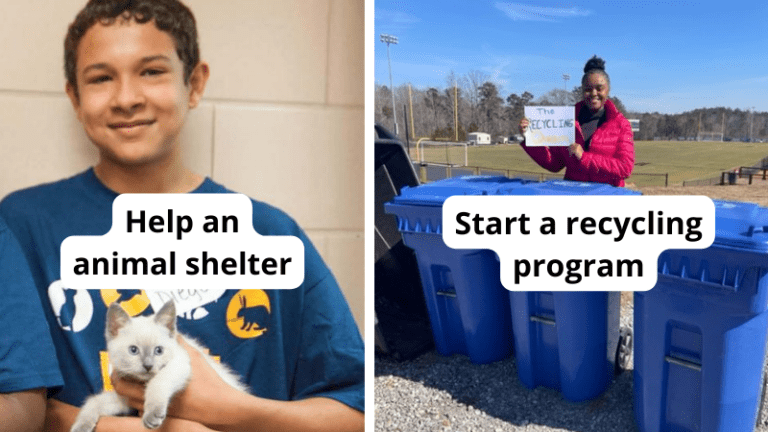
Service-learning projects not only get kids involved in their communities, they help them develop many valuable job-readiness skills that will help them on the job one day. Team students up to organize a book or food drive, recruit bilingual students to provide translation services, or encourage budding artists to collaborate on a community art event.
Skills they’ll practice:
Teamwork, respect, time management, responsibility
Learn more: 25+ Meaningful Service Learning Projects for Kids and Teens
4. Cultivate critical thinking
Critical thinking is the ability to examine a subject and develop an informed opinion about it. It’s about asking questions, then looking closely at the answers to form conclusions that are backed by provable facts, not just “gut feelings” and opinion. And it’s definitely on the top of most employers’ wish lists for new employees. Click the link below for 10 fun and engaging classroom activities that’ll get your students’ gears turning.
Skills they’ll practice:
Critical thinking, problem-solving, flexibility, self-confidence
Learn more: 5 Critical Thinking Skills Every Kid Needs to Learn and How To Teach Them
5. Human Marble Run
Working together to meet a goal takes patience and focus. This IRL version of Marble Run will help your students learn job-readiness skills like working together, and they’ll have fun doing it!
Give each member of the team a length of gutter or drainpipe. The team has to transfer a tennis ball or golf ball from one place to another by rolling the ball from one piece of gutter to the next. Make it interesting by making the team get the ball to traverse an obstacle course or to go up and down stairs.
Skills they’ll practice:
Patience, negotiation, teamwork, communication
6. No-hands cup-stacking challenge
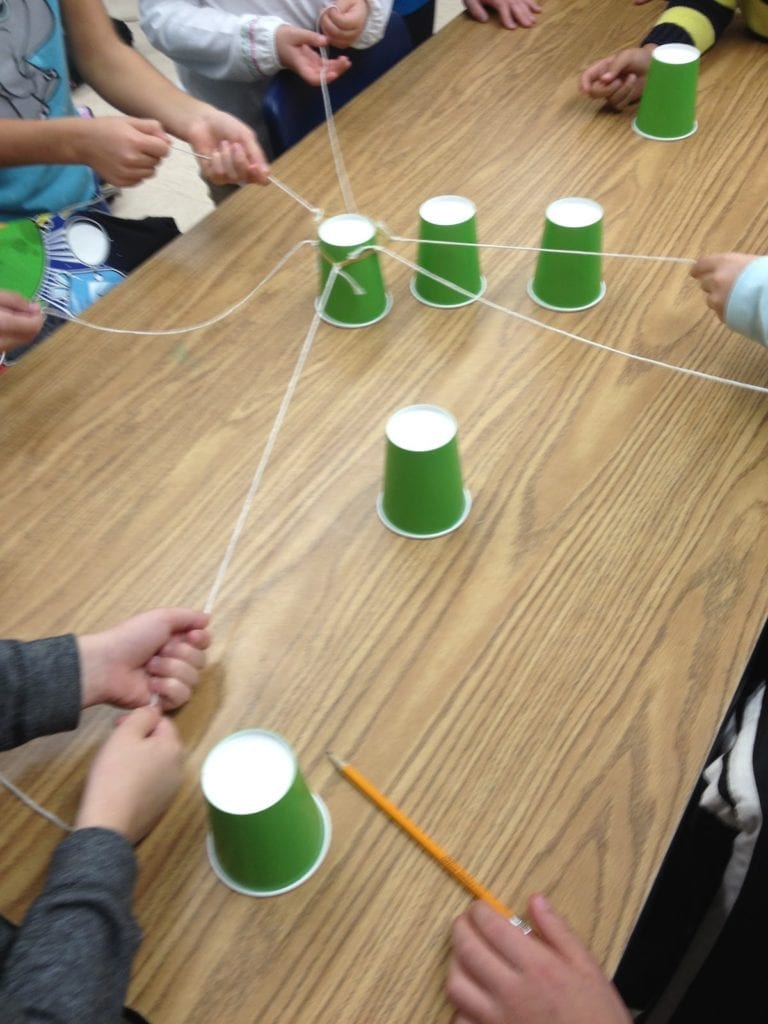
This hands-on group challenge is an exercise in learning job-readiness skills like patience and perseverance, not to mention it’s a total blast!
Decide how many students you want in each group, and tie that number of strings to a single rubber band. Each person in the group holds on to one of the strings attached to the rubber band. As a group, they use this device to pick up the cups (by pulling the rubber band apart and then bringing it back together over the cups) and place them on top of one another in order to build a pyramid.
Skills they’ll practice:
Critical thinking and problem-solving skills, teamwork, patience
Learn more: Cup Stack from Ms. Sepp’s Counselor Corner
7. Paper bag skits
You never know what life is going to hand to you. This is true at work, school, and in life in general. Sometimes you’re handed a set of circumstances and have very little time to figure out what to do. This fun activity will help teens practice thinking on their feet.
Fill a few paper bags with four or five assorted classroom or household items. Break the teens into groups, and assign each group a bag without showing them what’s inside. Give them two minutes to examine the items in their bag and come up with a skit, using all of the items, for the rest of the class.
Skills they’ll practice:
Time management, teamwork, flexibility, presentation skills
8. Nurture self-knowledge
Journaling is a powerful tool for creative expression and reflection, but did you know that it can also be an effective way to improve mental health? Recording your thoughts and feelings can be a cathartic form of stress relief, an opportunity to get to know yourself better, and a way to help you feel more grounded and authentic in your beliefs. Try these free writing prompt cards with your middle and high schoolers to help them get started.
Skills they’ll practice:
Stress management, self-confidence, motivation
Learn more: Deep Writing Journal Prompts for Teens from Journal Buddies
9. Foster self-motivation
Self-motivation is one of the key indicators of success in the future. Conversely, lack of motivation leads to big problems not in only school but on the job later on. But how do we teach something that comes from inside? Check out the activities below for some great tips like breaking big dreams into smaller pieces, envisioning a bright future, encouraging students to share their stories, and more.
Skills they’ll practice:
Work ethic, critical thinking, self-confidence
Learn more: How To Instill Intrinsic Motivation from 7Mindsets
10. Hold a poetry slam
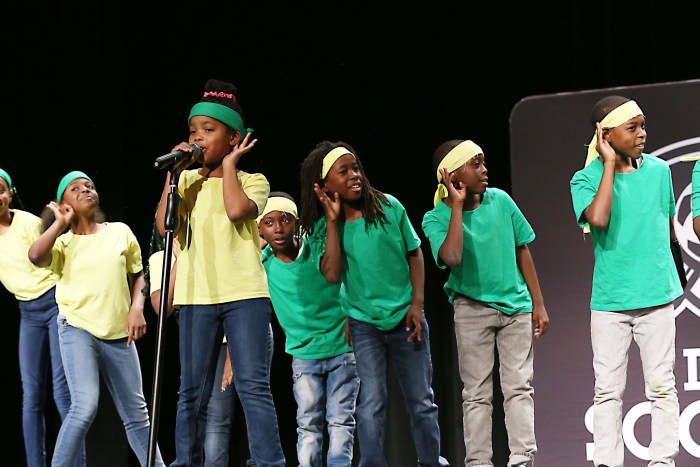
Slam poetry is a unique performance art that will not only give your students the opportunity to express their thoughts, but build their confidence as well. Slam poems are specifically written to be performed in front of an audience, and topics are often diverse, political, and thought-provoking. Finding your voice and being able to move people with your words are job-readiness skills that can apply to any future endeavor.
Skills they’ll practice:
Self-confidence, presentation skills, teamwork
Learn more: What Is Slam Poetry and How Can Teachers Use It With Students?
11. Team survival challenge
What would happen if your class went out on a pleasure cruise only to end up being lost at sea? Who would take charge? What materials would be essential for survival? If you ever saw an episode of the TV series Lost, you know that making these decisions as a group can get ugly fast. This activity is a great lesson in group decision-making, as students will undoubtedly have different ideas about what materials to add to a limited list in a limited amount of time.
Skills they’ll practice:
Critical thinking, negotiation, communication, teamwork
Learn more: Lost at Sea from Grahame Knox
12. Start a school garden
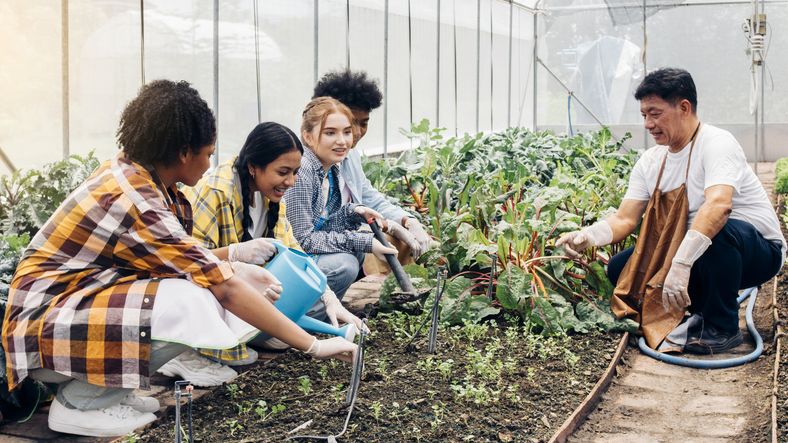
A school garden is an amazing, hands-on way to help teach students about responsibility. From planning what to grow and organizing the supplies needed to creating a maintenance schedule and actually getting down and dirty in the garden, it’s a project that requires hard work and perseverance.
Skills they’ll practice:
Responsibility, teamwork, problem-solving, patience
Learn more: How One School Garden Transformed a Neighborhood
13. Time-management challenge
We all have days when our list of tasks is huge, and the amount of time we have to complete them just isn’t. When time is tight, and your agenda is packed, you’ve got to prioritize tasks and work efficiently! This activity gives students the opportunity to practice just that by presenting them with a long list of tasks to complete in a limited time frame.
Make a list of tasks on chart paper, assigning a point value for each job. For example: Do 25 jumping jacks (5 points); make up a nickname for each member of the group (5 points); get every person in the class to sign a piece of paper (15 points); form a conga line and conga from one end of the room to the other (5 points, 10 bonus points if anyone joins you); etc. Make sure you list enough tasks to take up more than 10 minutes.
Divide your students into groups of five or six and give them 10 minutes to collect as many points as they can by deciding which tasks to perform. A debriefing session is essential with this game. Guide your students to think about how they made decisions, which group dynamics came into play, and how they determined the value of each task.
Skills they’ll practice:
Negotiation, critical thinking, communication, time management
14. Vision boards

Unleash your students’ creativity while at the same time helping them set goals for the future with a vision board. We don’t frequently take the time to express who we are and what we hope for. Setting aside time to contemplate can motivate teens to think deeply about what they really want in life and also fuel their desire to do what’s necessary in order to reach their dreams.
Skills they’ll practice:
Self-confidence, motivation, critical thinking
Learn more: Why Teachers Should Create Vision Boards With Their Students from Study All Knight
Image credit: Fatima Vieira
15. Collaborative contract
This exercise for middle schoolers helps them establish values-based ground rules for a team. Each student takes an index card and lists three values that they believe will promote a sense of community. Team members discuss the values, consolidating them into more precise categories. They write the finalized list on a poster board, with each student signing it. Whenever there is a dispute, the team should refer to the “contract,” which holds everyone accountable.
The purpose of this exercise is to create a safe space to explore ideas by focusing on common language and shared expectations. Additionally, this activity prepares middle-school students for the workplace by emphasizing similarities rather than differences.
Skills they’ll practice:
Negotiation, communication, listening, respect
16. Zombie apocalypse
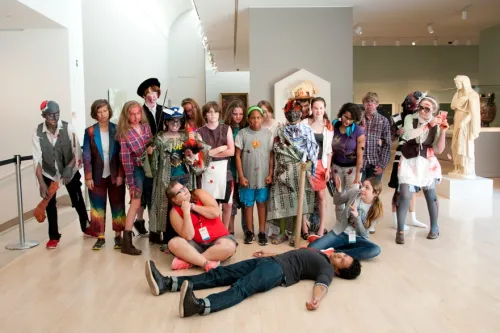
In this two-day lesson, students are required to identify soft skills, literary guides, and everyday objects that will help them survive a zombie apocalypse. They’ll work both cooperatively and independently, and produce short pieces of persuasive writing to argue in favor of their survival.
Skills they’ll practice:
Teamwork, interpersonal skills (collaboration), problem-solving
Learn more: Zombie Invasion Plan from Sarah Andrasik
Image source: Dallas Museum of Art
17. Stoke their competitive fire
According to teacher Christine Weis, there’s nothing like a little healthy competition in the classroom. “It motivates students and drives them to put forth their best effort,” she says. “It sparks interest, passion, and ignites a fire within.” Not only can healthy competition build confidence, it can encourage students to learn something new and develop new skills. Try games, puzzles, sports, quiz competitions, team presentations, etc., to motivate your students to reach a higher level.
Skills they’ll practice:
Motivation, work ethic, problem-solving, self-confidence
Learn more: 7 Motivational Activities for Students from The Homeschool Resource Room
18. The blindfold game
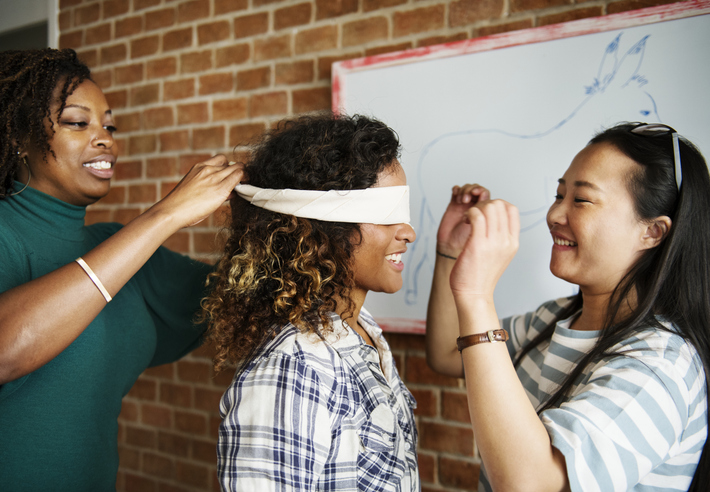
Teens leading one another around in blindfolds? Are we sure this is a good idea? The answer is yes when it’s part of a structured, purposeful job-readiness skills activity like this one!
You’ll need a large space for this activity (maybe the cafeteria after lunch or the gym during an off-period), enough blindfolds for half of the participants, and furniture and other items that you can use as obstacles (cardboard boxes, pillows, chairs, tables). Scatter furniture and objects around the room before the activity begins. Your course should be challenging but safe to navigate.
Pair students and have them line up at one end of the room. One person from each pair should put on the blindfold. The sighted person must guide their partner across the room and give them clear oral instructions (without touching them) to help them avoid the obstacles. When each team reaches the far side of the room, partners can switch roles and repeat the exercise. Have just a few pairs tackle the course at a time so that the others can observe. Take some time between rounds to process what went well, what didn’t, and what could make the challenge easier.
Skills they’ll practice:
Communication, listening, respect (taking the task and their partner’s safety seriously), flexibility
19. Take a mini crash course
Our teens may almost look like adults, but we have to remember they still have a lot to learn. And sometimes the best way to teach them what they need to know is to just spell it out. This video is a no-nonsense tutorial about some of the job-readiness skills that employers find valuable. Hold a screening, then after the video, have students form breakout groups to talk about what portion of the video they found most helpful and what they need to work on.
Skills they’ll practice:
Communication, listening, critical thinking
20. Human knot
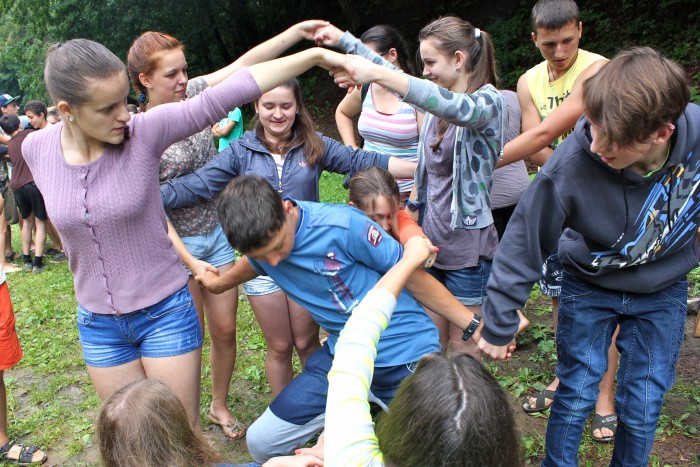
Nothing promotes job-readiness skills such as cooperation like getting all tangled up with your classmates—literally!
Players stand in a circle and reach out to shake hands with other players, with each hand holding that of a different person, creating a “human knot.” Then the players have to figure out how to untangle their bodies without letting go of each other’s hands. This activity lends itself to a vibrant debriefing session as students observe their communication and cooperation skills.
Skills they’ll practice:
Teamwork, communication, problem-solving
Learn more: The Human Knot Game from Icebreaker Ideas
21. Mind your mental health
Managing stress in school (and on the job) is a timely subject. With mental health issues on the rise across the country, it’s critical to teach your students strategies that will help them stay grounded and build resilience. After all, it’s hard to do your best in any endeavor when you’re stressed to the max. Try the empowering activities below to teach students how to manage stress so students can succeed in college, on the job, and in the future.
Skills they’ll practice:
Self-confidence, problem-solving, leadership
Learn more: 22 Empowering Mental Health Activities for Teens
22. Rope Circle Shimmy

Divide the teens into two groups. Each group should have a minimum of five members. To begin play, make a big circle out of rope for each team and put it on the floor. Each member of the team stands at the edges of the circle, so the rope is taut around their ankles, while holding their hands in the air.
Team members must take turns moving to work the rope up from ankles to wrists, keeping hands in the air at all times. The team member will have to wiggle and move to slide the rope up. Other team members can help by keeping the rope as taut as possible. The team that finishes the challenge first wins!
Skills they’ll practice:
Communication, flexibility, interpersonal skills (cooperation)
Learn more: Looped to Rope from Mom Junction
23. Four-card negotiation
Sometimes to get ahead in life, you have to know how to wheel and deal. This is entirely what this lesson is all about. The objective is for teams to trade and barter for pieces of cards to match up with the pieces they already have and ultimately end up with four complete playing cards.
Start with a pile of playing cards (four cards per team of four or five students). Cut each card diagonally into four pieces and mix all of the pieces together. Now divide the mixed-up pieces evenly among the teams. Give teams a couple of minutes to sort out their card pieces and figure out which pieces they have and which pieces are missing. Set a timer for 10 minutes. The goal of the game is for the students to use their negotiation skills with the other teams in order to gain as many complete cards as possible for their team. At the end of 10 minutes, the team with the most cards wins.
Skills they’ll practice:
Negotiation, communication, interpersonal skills
24. Pair up with younger kids
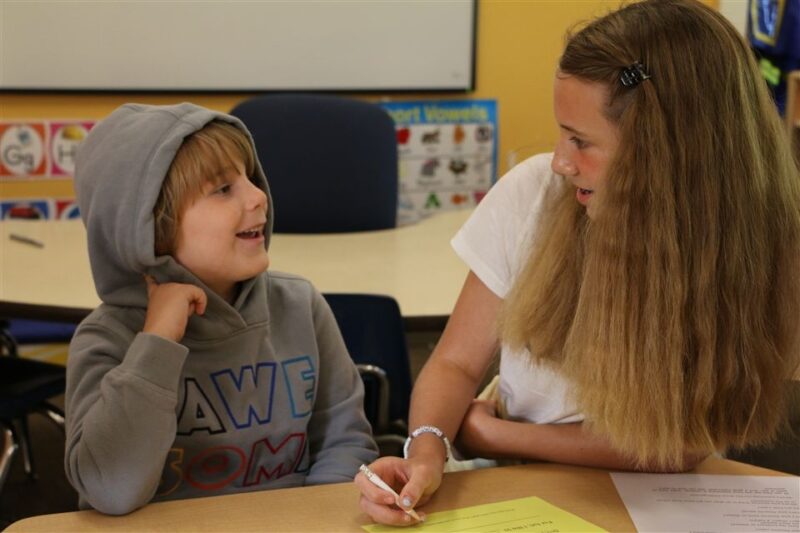
Nothing helps teens build responsibility like pairing up with a younger buddy. Being the more mature, more experienced partner in the relationship gives teens the opportunity to share what they know and learn to be a leader. Have your students plan fun activities and special events with their buddies.
Skills they’ll practice:
Responsibility, leadership, problem-solving, listening, patience
Learn more: 20 Activities for Big Buddy/Little Buddy Time from Create, Dream, Explore
25. Blind spelling practice
Weaving soft-skills activities into everyday curriculum is a win for everyone. Enhance your students’ interpersonal skills with this fun spelling activity. Tape letters to each student’s back. Then call out a definition of a word. Students will need to work together to assemble in the right order to spell the word correctly.
Learn more: Manuel Antonio Noronha
Skills they’ll practice:
Communication, listening, negotiation, problem-solving
26. Practice small talk

Teenagers aren’t exactly known for their chitchat skills. In fact, for many it is one of the most awkward situations they can imagine being put in. But small talk is considered a foundational job-readiness skill that is important for almost every job, as well as learning to network. Many teens feel awkward speaking with people they’re not used to speaking to and need practice, especially with adults. Try some free conversation starters that will help them practice the “three P’s” of small talk: being polite, positive, and professional.
Skills they’ll practice:
Communication, listening, self-confidence, patience, respect
Learn more: Conversation Starters on the Job from Realityworks
27. Blind drawing
Try this hilarious activity with your teens. It kind of like “telephone” but instead of listening, each person must pay close attention to what is being drawn on their back. Each student in the line gets a blank sheet of paper taped to their back and a marker. The student at the end begins by slowly drawing an image on the person’s paper in front of him. When that person feels what’s being drawn, they try to re-create what they’re feeling on the person of front of them. When the image is complete, have the students take off their papers and compare the results. This activity is a colorful reminder that people often perceive things very differently, so communication is extremely important!
Skills they’ll practice:
Communication, teamwork, patience
28. Mock interviews

The prospect of going on a job interview can be terrifying to a kid who’s never had a job before. Practicing job-readiness skills like interviewing can help them reduce the fear factor and build their confidence. Pair students up and assign one the role of interviewer and one the role of interviewee. Use a set of job interview questions to practice with.
Give each pair 15 minutes, then have them talk about how the interview went. The interviewer may have some valuable insight for the interviewee. Then have the partners switch roles and repeat. After they’ve had practice with their peers, invite a few adults into the room to conduct mock interviews.
Skills they’ll practice:
Interview skills, critical thinking, self-confidence
Learn more: Job Interview Questions for Teens from Understood.org
29. Group storytelling
Create small groups of three to eight students. The first person makes up and says out loud the first line of a story. The second person says, “Yes, and …,” continuing the story. Play continues around the group until everyone has contributed or until the story has come to a satisfactory end. Since students don’t know what’s coming, they have to learn how to listen carefully and react and communicate well on the fly. As an alternative, to have students listen even more carefully, have them continue the story with the phrase, “because …”
Skills they’ll practice:
Communication, listening, critical thinking, presentation skills
30. Team pen
Sometimes it takes the whole team to produce results. This fun game involves a marker with four to six strings tied to it and a blank piece of paper. The teacher calls out a word and the team has to work together to legibly print the word on the paper. Students will have to think carefully and cooperate with one another to maneuver the pen correctly to write the word.
Skills they’ll practice:
Communication, teamwork, patience, critical thinking
For more articles like this, be sure to subscribe to our newsletters!
Also, check out 8 “Would You Rather” Questions To Get Teens Thinking About Their Future Careers.
[ad_2]
Source link
